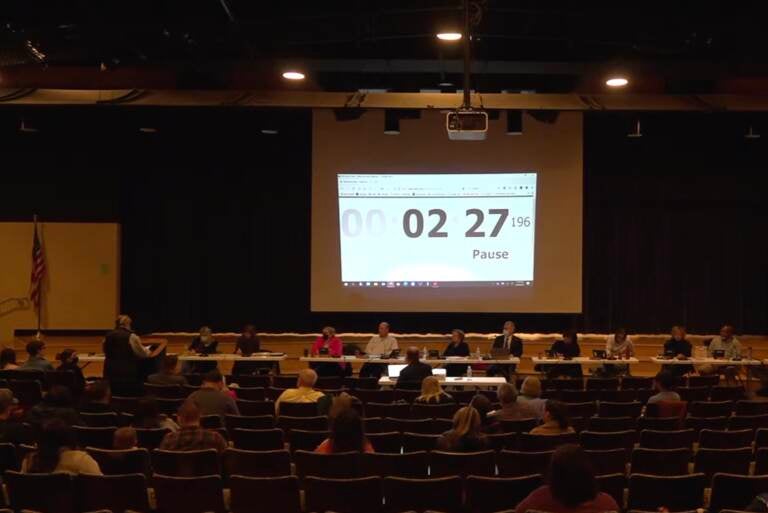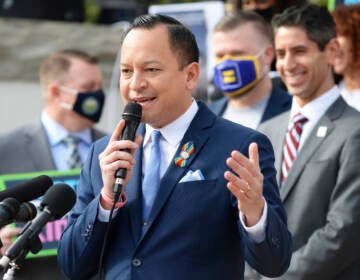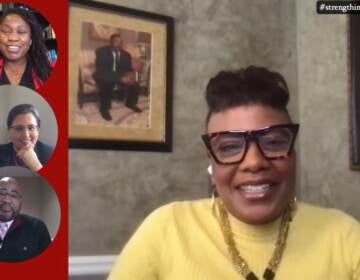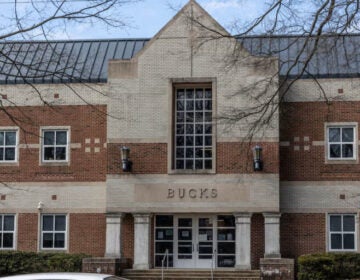Why a request for West Chester district data on LGBTQ students spurs privacy worry
Officials denied most of the sensitive information sought, but the demand raised concerns about infringing rights of students and families.

Resident Jenifer MacFarland (pictured far left at the podium) makes a public comment — and hand delivers a Right to Know Law request to the West Chester Area School District seeking information on LGBTQ students. (Screenshot/Youtube)
Over the last month, worries about students’ privacy have sprung from one person’s request for information on LGBTQ children in the West Chester Area School District.
The Right to Know Law request, filed by a district resident, stemmed from her objection to availability of the book “Gender Queer: A Memoir” in high school libraries. The request asked for data on the percentage of LGBTQ students in the district, the number of referrals to guidance counselors regarding those students, and how many times the book had been checked out.
Though the request was largely denied with the exception of the book data, the demand for the sensitive information has raised serious concerns about infringement of the privacy of LGTBTQ students and their families. (The school board voted, 8-1, Monday night to keep “Gender Queer: A Memoir” on the libraries’ shelves.)
Vic Walczak, legal director of the American Civil Liberties Union of Pennsylvania, said there are “very important privacy protections” for students.
“For instance, there is federal law that prohibits the disclosure of student records. They can be disclosed to the individual student and his or her family, but that they can’t be disclosed beyond that. And even under the Pennsylvania Right to Know Law, there are a number of exemptions that recognize the importance of keeping personal private information confidential, whether that’s around public employees or civilians or government contractors, there are a number of exemptions, which would restrict the ability of the school district to release any kind of student-specific information,” Walczak said.
West Chester Superintendent Bob Sokolowski told WHYY News that he wanted to assure community members that the school district does not keep track of the number of LGBTQ students — part of the reason the Right to Know request was mostly denied — and that he is committed to making sure the district is welcoming to all.
In all his years in education, Sokolowski said, he had never received a request quite like the one submitted last month. He thinks it would be invasive to even collect the data.
“As a former high school principal, I’ve actually had students who have struggled with their identity. And I’ve had students who have actually sought me out in the past where — ‘Dr. Sokolowski, you’re somebody who’s been helping me and mentoring me, I’m pretty sure I’m gay.’ And I’ve had kids come out to me before. I’ve also worked with students who have been in transition, and working closely with their families,” Sokolowski said.
The students targeted in the request are not simply abstract numbers to be called on willingly, he said — they are very real, and their issues are “personal” to both him and the school.
Sokolowski said he takes pride in West Chester’s diversity.
“Making sure … that your students know that it’s inclusive and it’s a supportive community is highly important,” Sokolowski said, adding that he wants kids to be able to see themselves in the media they consume.
“It’s important for students to not only have people that they could identify with in their school, but in something that may be so private and so delicate as sexual orientation, that maybe reading a book can provide them that support and may then lead them to have a better understanding of where they are in their lives,” Sokolowski said.
Walczak said ACLU-PA’s stance is that schools are a place of not only learning about what you know, but also learning about the experiences of people different from you. From his perspective, any district assessing which books belong in libraries using “arbitrary percentages of students” identifying as a vulnerable group is “completely missing the point of education.”
“Those books are not just for LGBTQ students, they are for everybody, and everybody can learn from them. And if the school district were to start making decisions about removing books based on that kind of criteria, they could expect a lawsuit from the ACLU,” Walczak said.
WHYY News was unable to find contact information for Jenifer MacFarland, the resident who made the Right to Know request, to seek a comment from her. An October 2021 Facebook post from the West Whiteland Republicans identified MacFarland as guest speaker for an event condemning critical race theory. It was unclear whether she will continue to pursue the information denied in her Right to Know request.
MacFarland, however, had a district resident read a letter on her behalf at Monday night’s school board meeting, defending her request for data and criticizing the book review committee she took part in that was tasked with making a recommendation to the board on whether certain books should stay.
“This was a very poorly run meeting with a clear agenda — to rush this book through the committee and recommend it to the board for approval. Indeed, the last item on the circulated agenda was confirm recommendation, and this was before the committee met. And that, my friends, was the intention all along, wasn’t it? In addition, let me state for the public record that at no time have I asked for names of any students, LGBTQ or otherwise. Any statements by all others is a complete falsehood, and one need only to view the video of last month’s video to verify that fact,” the letter read by the resident said.
The West Chester Area School District serves West Chester Borough, West Goshen Township, East Goshen Township, Westtown Township, East Bradford Township, West Whiteland Township, and Thornbury Township. In total, the school system serves roughly 12,000 students.
Parents and community members told WHYY that they were dumbfounded by MacFarland’s request, but ultimately not surprised by the spectacle surrounding it.
Nancy Wood is a parent of four children in the district. She was there Feb. 28, the night of MacFarland’s request.
“As a parent, I was very alarmed. I think most people in the audience were alarmed. There was an audible gasp when she made that request. But I think, reflecting back on it, even beyond the shock value of her asking for that information, if you think about the premise of her question, it really kind of gives insight into the mindset of some of these groups that are working to undermine public education in our communities,” Wood said.
She thinks what’s behind the request represents an “archaic” attitude — which, she added, isn’t how education is supposed to work.
“Because in order to develop critical thinking, our students need to be exposed to a variety of perspectives. They need to be exposed to diversity, that’s part of learning, and that’s part of education,” Wood said.
Wood has been seeing a troubling trend in recent years in the West Chester Area School District. She said that she has witnessed a culture of “nonsense” conspiracy theories fuel attacks on parents, teachers, and vulnerable students.
The tool being used the most is fear, she said. And while she supports the district, Wood believes that it has been slow to adapt to the increasingly complex attacks from a certain subset of parents.
“They want parents to be afraid that their kids are being exposed to pornography or being groomed, they want parents to be afraid that their kids are being transformed into Marxists or indoctrinated, or that they’re going to be seen for being white. And none of that is true. But I do want our district to recognize that this isn’t going away, and that they need a strategy to combat it, because it is taking away time and resources that we as families and as a community need our district to really be focused on,” Wood said.
She noted the seemingly orchestrated nature of such incidents not only in her district, but across the suburbs, in the Pennridge and Souderton districts for instance, and even statewide.
Shannon Bruno, another West Chester district parent, agreed.
“This is a calculated effort that is happening from a group and groups that are funded by political PACs, and by politicians to invest themselves and involve themselves in public schools in places where they shouldn’t be,” Bruno said. “And so Jennifer MacFarland asking that question is wrong, but Jennifer MacFarland is part of bigger groups.”
Groups such Moms for Liberty, a Florida-based conservative nonprofit whose ideologies have spread into Philadelphia’s collar counties, have her concerned, said Bruno, who was also present during February’s public meeting. She said she was shocked, disappointed, and upset by MacFarland’s comments.
“While logically I know that it’s going to be fruitless, I think that the damage is already done within the meeting because she sought to further engage and enrage a group of people who are already up in arms about things that are covered by an individual’s civil rights within a public school system … mission accomplished,” Bruno said.
In the future, she wants the district to be more proactive rather than reactive when it comes to pressure from parents demanding information on vulnerable student groups in the schools.
Bruno is worried about an information gap among parents that could send some into a panic with the most recent behavior.
“I know that our district doesn’t collect [data on LGBTQ students], but the average parent who’s not totally paying attention doesn’t know that. And so should they come across something like an article, they’re going to be like, ‘What do you mean? My gay child is now being put on a list to this random woman just because she requested it,’ So I think proactively discussing what’s protected would really help a lot of parents,” Bruno said.
The ACLU’s Walczak said any time an attempt is made to identify vulnerable minority groups, there are grounds for questioning the intent of the requester.
Going forward, he recommends that districts experiencing these issues consult with their solicitors to ensure that sensitive student information is not being given out to the public.
“The ACLU is very concerned about what we’re seeing across the country, and certainly here in Pennsylvania, where it really is about canceling the voices of Black and brown people and in many cases, LGBTQ folks,” Walczak said.
While Sokolowski understands people’s anger about the situation — he acknowledges that it has been difficult — he also sees a silver lining that could lead to a better outcome.
“This is actually not so much bad news,” he said, “because I think actually, by in some ways drawing attention to this, that this may bring more attention to the importance of LGBTQ rights not just in our school, but in our communities.”
The books will stay
Monday night’s school board board meeting lasted more than four hours. On the agenda was the fate of two books on the shelves of West Chester school libraries: “Gender Queer: A Memoir” and “Escaping a Sinking Ship.”
Though a faction of parents pushing for a book ban attended the meeting, students in support of keeping the titles were present in full force and delivered to the board and its audience impassioned remarks about the importance of the books.
A freshman trans high school student, Wesley, stepped up to the podium to defend “Gender Queer,” citing the high suicide rates among LGTBQ young people across the country.
“While we sit here, multiple lives are taken. Let that sink in. Let the fact that you want to ban a book that could save those lives sink in — lives of teens that have a whole life ahead of them, teens that think they should end their life because of who they are, teens like me — teens like me that only have a list of reasons to stay, a list,” said Wesley, who did not give a last name.
The room went silent.
“If it wasn’t for the tremendous support of my parents, this book, a school name change, and most importantly, the opportunity to play on the boys tennis team, I may not be speaking here today. This book can be a reason why a teen like me stays. The book that so many of you are trying to remove. I am proof that this book already saved one life. If that’s not not enough, I don’t know what is. Thank you.”
Wesley’s remarks brought a round of applause from the audience.
Some of the students’ positions were met with bigoted remarks from opposing parents, according to some parents present at the meeting, which was held both in person and virtually.
The board ultimately decided, in two separate 8-1 votes, in favor of keeping the books in school libraries.
WHYY is your source for fact-based, in-depth journalism and information. As a nonprofit organization, we rely on financial support from readers like you. Please give today.









